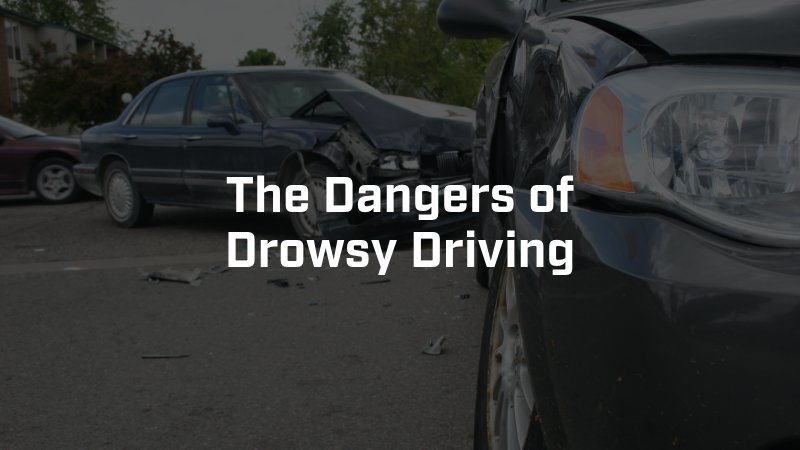We’ve all been sleepy behind the wheel, but the reality is that drowsy driving can lead to major accidents and severe injuries on Arizona roadways. Unfortunately, fatigued driving is a significant problem for drivers in our area. Victims of drowsy driving accidents should be able to recover compensation with the help of a Phoenix, AZ personal injury lawyer, but these claims can present challenges when it comes to determining liability.

The Dangers of Drowsy Driving
Drowsy driving occurs when a driver operates a vehicle while fatigued, leading to impaired attention, slower reaction times, and poor decision-making. Similar to operating while impaired by alcohol or medications, being overly tired behind the wheel severely impacts a driver’s ability to operate safely. Unfortunately, drowsy driving accidents often result in serious injuries or even fatalities because the driver is less likely to respond quickly enough to avoid a crash.
Fatigue can set in gradually, and drivers may not realize how dangerous it is to continue driving when they are tired. It is important to understand that the effects of drowsy driving can be as severe as drunk driving, making it a significant public safety issue.
Causes of Drowsy Driving in Arizona
There are many factors that can contribute to drowsy driving, and certain groups of people are more at risk than others. Some common causes of drowsy driving in Arizona include:
- Sleep deprivation. Many people do not get the recommended 7–9 hours of sleep each night, leading to chronic fatigue. Sleep-deprived drivers are much more likely to experience drowsiness on the road, increasing the likelihood of accidents.
- Shift workers. Individuals who work night shifts, irregular hours, rotating shifts, or long hours are particularly vulnerable to drowsy driving. Their irregular sleep schedules can cause fatigue at times when they need to be alert.
- Commercial drivers. Truck drivers are at higher risk for drowsy driving due to long hours on the road. Federal regulations exist to limit the number of consecutive hours truck drivers can operate, but fatigue remains a significant issue in the trucking industry.
- Sleep disorders. Conditions like sleep apnea, insomnia, and restless leg syndrome can cause interrupted or poor-quality sleep, leading to daytime drowsiness. Drivers with untreated sleep disorders may not be fully aware of how their condition affects their ability to drive safely.
- Medication side effects. Some prescription medications (and some OTC drugs) can cause drowsiness as a side effect. Drivers should be aware of how their medications impact their ability to stay awake and alert behind the wheel.
How Drowsy Driving Accidents Happen
Drowsy driving accidents can occur in various ways, often leading to dangerous and devastating outcomes. Common scenarios include:
- Rear-end collisions. Fatigued drivers may not notice that the car in front of them has stopped or slowed down, resulting in a rear-end collision.
- Lane drifting. Drivers who are drowsy often have trouble staying within their lane. They may drift into neighboring lanes or onto the shoulder, increasing the risk of sideswipe accidents or collisions with barriers.
- Head-on collisions. In extreme cases, a drowsy driver may fall asleep at the wheel of a much larger vehicle and drift into oncoming traffic, causing a head-on collision. These accidents are often fatal or result in catastrophic injuries.
Establishing Liability in a Drowsy Driving Accident
Determining liability after a drowsy driving accident can be challenging, but it is crucial to proving your case and recovering compensation. Several factors can be used to establish negligence and hold the responsible party accountable:
- Driver behavior. Evidence of erratic driving behavior, such as swerving, drifting, or inconsistent speed, can help show that the driver was too fatigued to operate the vehicle safely. Testimony from witnesses or video footage may also support your claim.
- Driver logs. In commercial trucking cases, driver logs are essential to proving fatigue. Truck drivers are required to follow strict hours-of-service regulations, and these logs can show whether the driver exceeded the allowed hours or failed to take required breaks.
- Medical evidence. If the driver has a sleep disorder or was taking medications known to cause drowsiness, this information can help establish that fatigue was a factor in the crash. Medical records, prescriptions, and doctor statements can provide critical evidence.
- Accident reconstruction. Accident reconstruction experts can analyze the scene and the vehicles involved to determine the likely cause of the crash. This can include examining skid marks, vehicle damage, and the position of the vehicles after the accident.
Contact an Attorney After a Drowsy Driving Accident
Drowsy driving accidents are preventable, yet they continue to cause harm on Arizona’s roadways. If you or a loved one has been injured due to the negligence of a fatigued driver, it is important to speak with an experienced injury attorney as soon as possible. These cases can be difficult to prove, but a skilled Phoenix car accident lawyer will conduct a thorough investigation and fight to secure the compensation you deserve.
